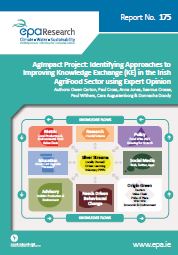Research 175 - AgImpact Project: Identifying Approaches to Improving Knowledge Exchange (KE) in the Irish AgriFood Sector using Expert Opinion
Authors: Owen Carton, Paul Cross, Anna Jones, Seamus Crosse, Paul Withers, Cara Augustenborg & Donnacha Doody
Summary: There is significant pressure to develop knowledge exchange (KE) processes that will facilitate the application of existing and new knowledge in order to deliver increased agricultural production efficiency and profitability while protecting natural capital including water.

Identifying Pressures
There is significant pressure to develop knowledge exchange (KE) processes that will facilitate the application of existing and new knowledge in order to deliver increased agricultural production efficiency and profitability while protecting natural capital including water. During the AgImpact workshops the participants identified that key pressures on KE processes are the variability in the bio-physical environment in which production agriculture occurs, and variability in the socioeconomic and demographic profiles of those involved in implementing the knowledge. It was clear from the workshop discussions that the ever increasing knowledge base, its complexity and its often “compartmentalised” nature further adds to the pressure. In addition the project identified that at policy level, conflicting goals and agendas has led to a level of uncertainty that increases the pressure on stakeholders in applying knowledge.
Informing Policy
The growth in the agri-food industry, as envisioned in Food Wise 2025 and Northern Ireland’s Going for Growth strategic plan, must be achieved within the context of the targets established within European Union environmental directives, such as the Nitrates (91/676/EEC) and Water Framework Directives (2000/60/EC). The project workshop participants identified that the increased complexity of the agri-food system, with multiple economic, environmental and social policy objectives in addition to a broader range of stakeholders, requires on-going innovation to ensure a KE framework that reflects this new order. It was agreed that at policy level there was a need for a common vision for how sustainable intensification of agriculture could be achieved within the constraints of current environmental regulation.
Developing Solutions
The key recommendation from this project is the need to change from the traditional topdown linear knowledge transfer model of KE to a more balanced system that integrates both a bottom up and a top down approach. A suggested approach to achieving this integration was the establishment of a grant scheme that could be used to initiate a catchment competition. This scheme would focus on providing community stakeholders with funding and resources to integrate a bottom up approach to KE into exiting top-down structures within their catchment.
https://www.epa.ie/media/epa-2020/publications/research/thumbnail-175_Page_1[1].jpg